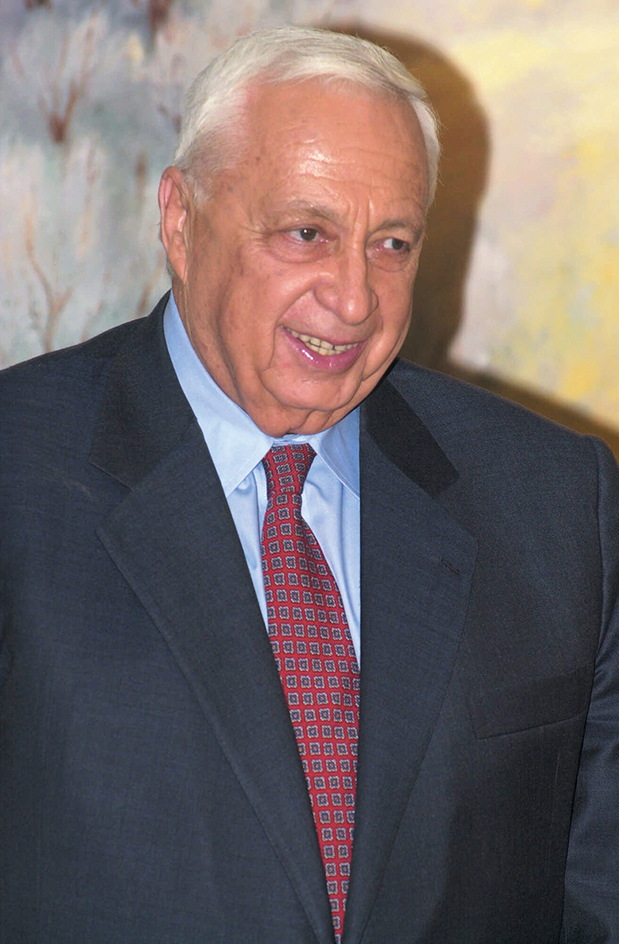Sharon, Ariel, << shah ROHN, ah ree EHL >> (1928-2014), was prime minister of Israel from 2001 to 2006. Sharon, nicknamed “Arik,” was known for many years as a critic of the Oslo peace process between Israel and the Palestinians. Throughout most of his career, he was a strong supporter of Jewish settlements in the West Bank and Gaza Strip, territories that Israel occupied in 1967.

Sharon was born in 1928, probably on February 27, in Kfar Malal, a Jewish cooperative farming settlement near Tel Aviv in what was then Palestine. His original name was Ariel Scheinerman, but he later adopted the name Sharon. As a teenager, he joined an underground Jewish defense force that had been set up to protect Jewish settlers from Arab raiding parties. From 1948 to 1973, he served in the Israel Defense Forces, where he rose through the ranks. He became a major general in 1967. He fought in the Israeli war of independence in 1948, the Sinai campaign of 1956, the Six-Day War of 1967, and the Yom Kippur War of 1973. Among some people, he gained a reputation for bravery. Others, particularly Palestinians, considered him ruthless.
In 1973, Sharon entered politics. He helped form Likud, a bloc (alliance) of conservative political parties, to challenge the Labor Party’s control of the Knesset (Israeli parliament). He was elected to the Knesset, but he resigned in 1974. In 1975, he became an adviser to Prime Minister Yitzhak Rabin. In 1977, Sharon was again elected to the Knesset. He held many Cabinet posts, including minister of agriculture in charge of settlements from 1977 to 1981 and minister of defense from 1981 to 1983.
As defense minister, Sharon directed the Israeli invasion of Lebanon in June 1982. The invasion was primarily a response to attacks on northern Israel by Palestine Liberation Organization (PLO) forces based in southern Lebanon. Sharon was criticized for extending the invasion north into Beirut, the Lebanese capital. He also was criticized for failing to prevent a massacre of hundreds of Palestinian civilians in September 1982 by Lebanese Christian militia forces in the Israeli-occupied part of Beirut. Sharon was forced to resign as defense minister in February 1983 after an Israeli commission declared him indirectly responsible for the incident. Sharon went on to serve in other Cabinet roles.
In 1999, Sharon was elected chairman of Likud. In September 2000, he made a controversial visit to the Temple Mount in Jerusalem. The Temple Mount, known to Muslims as Haram al-Sharīf, is a holy site for both Jews and Muslims. At the time, disagreements over who should govern the site were stalling peace talks between Israel and the Palestinians. Sharon’s visit led to violence between Palestinian protesters and Israeli troops in Israel, the West Bank, and the Gaza Strip.
The violence led Israeli Prime Minister Ehud Barak to call a special election for prime minister. In the 2001 election, Sharon defeated Barak. In parliamentary elections in January 2003, Likud won the largest number of seats in the Knesset. Sharon remained prime minister.
In 2004, Sharon announced a plan to remove Jewish settlements and Israeli troops from the Gaza Strip and four West Bank settlements. In August 2005, the settlers were evacuated, and the last Israeli troops left in September. Many Likud members had opposed the plan, and the party began to split. In late 2005, Sharon asked for early elections. He left Likud and formed a moderate party called Kadima, which is Hebrew for forward.
In January 2006, Sharon suffered a major stroke and fell into a coma. Deputy Prime Minister Ehud Olmert became acting prime minister and acting head of Kadima. Parliamentary elections were held in March 2006, and Kadima won the largest number of seats. Olmert, as head of Kadima, became prime minister. Sharon died on Jan. 11, 2014.
